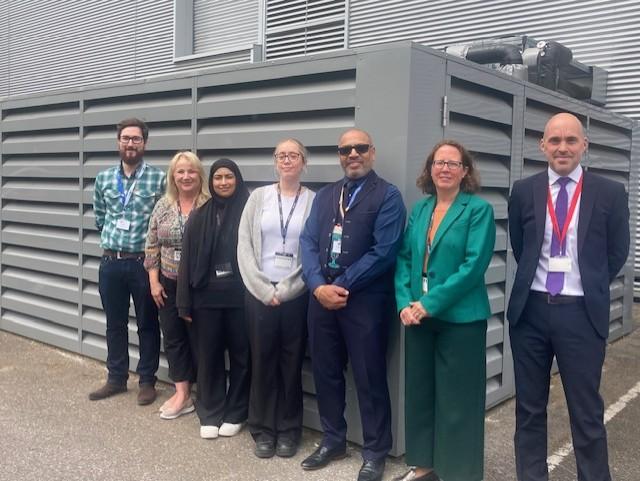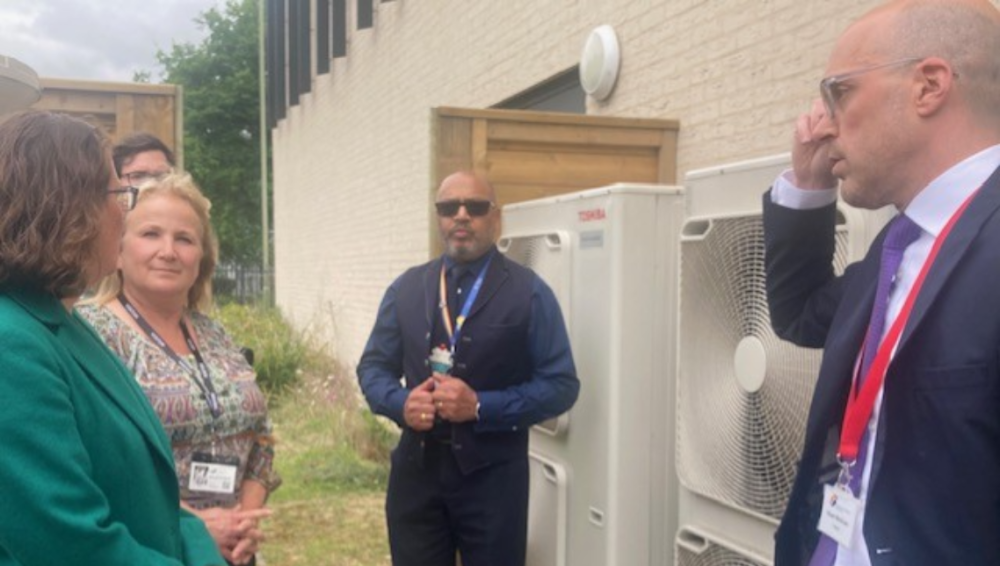Hampshire college looks to the future with ambitious green vision
Salix chair Baroness Natalie Evans meets college principal to talk about net zero plans
Much of our learning is based on challenge – without challenge learning is stilted.
This philosophy is very much in evidence at Farnborough College of Technology, Hampshire, which supports more than 5,000 students across two main campuses.
At Salix, we’ve been working with the college as it progresses its net zero journey through the Public Sector Decarbonisation Scheme.
This means it can invest in decarbonisation technologies transitioning the college away from fossil fuels and significantly reducing its carbon footprint and energy usage.
This is better for the climate.
The college has a key role in addressing climate change, not only to reduce their own environmental impact but to inspire broader change across its communities.
It also has a responsibility to the generations of the future.
We visited the college this week alongside our Salix board chair Baroness Natalie Evans to see how works are progressing in a project which is set to complete in March 2026.
As well as meeting college Principal CEO Virginia Barrett, we were able to chat with the people behind the net zero works.

Pictured, from left, Ben Gaut, college head of marketing, Norma Landgraf, senior manager at the Department for Education, Hira Raashid and Claudia Head from Salix, Pankaj Makwana, college director of finance and corporate services, Baroness Natalie Evans, and project director and manager for the college Stuart Markham.
Photo credit: Salix Finance
It's great to see the passion of the leadership here and the engagement of students in this project.
Young people here are very excited about the fact that this college is forward-thinking and undertaking such an exciting project. And we can already see the changes walking around the college, looking at the new technology. And there's still further work to do, but I think they've been very inspired by what they've achieved so far.
Natalie said: “It's great to see the passion of the leadership here and the engagement of students in this project.
“Young people here are very excited about the fact that this college is forward-thinking and undertaking such an exciting project. And we can already see the changes walking around the college, looking at the new technology. And there's still further work to do, but I think they've been very inspired by what they've achieved so far.”
The college is using its 10-year Property Strategy to transform its site.
The £10m project has been partly funded by a £4.8m grant from the Public Sector Decarbonisation Scheme.
Virginia Barrett explained her vision for the future. She said: “The hope really is that we will be a living example of what's possible.
“We want to be a carbon neutral ecosystem for our businesses, our schools, our colleges, our community around us and say, ‘this is the art of the possible.’
“It's well worth doing. We know this. We know it's important for us to get on board and start to remove the gas from our buildings.
“And for me, just being able to look to the future and think for our children, for our grandchildren, for our students who are coming forward, we're contributing towards that journey.”
During our visit we were able to better understand the issues the college has faced during its work with our teams.



Reinforced Autoclaved Aerated Concrete
The Public Sector Decarbonisation Scheme work has been partly delayed by an issue with Reinforced Autoclaved Aerated Concrete (RAAC).
In October 2024 the college announced the undertaking of construction projects to address the presence of RAAC on its main campus and works to install sustainable technologies.
The RAAC replacement works involved the removal and replacement of ceilings and the college was awarded £24m from the Department for Education to deal with it.
In spite of the RAAC work, the college has been able to adhere to its sustainability strategy through the Public Sector Decarbonisation Scheme project.
Project manager Stuart Markham explained how the college had to navigate the challenges. He said: “It's been a real collaboration of property professionals.
“One of the key challenges has been to try and retrofit technologies into buildings that are 40 years old.
“We’ve had to first of all establish how those buildings perform. So, we have done a lot of work to look at heat loss, heat gain, what our electrical demand is, what our water usage demand is, and then help shape the proposed solutions around those key indicators.”
The Public Sector Decarbonisation Scheme is a Phase 3b multi-year project has been able to focus on improving the thermal efficiency of older buildings, replacing their heating systems with heat pumps, installing LEDs, solar PV and smart systems as well as replacing air handling units.
Stuart added: “This is a once in a generation opportunity to renew critical infrastructure on this unique campus.
“This should last in excess of 25 to 30 years. And what we are doing is changing all of the heating and the water generation network.
“It's fantastic. We're really proud of this project.
“One of the things we have done is a lot of student engagement and understanding what the students' aspirations are for this campus.
“What's clear is this generation has a real appetite and is demanding improved environmental performance and so it's great to be able to address that challenge that has been laid down by today's learners.”
The challenges have been met with energy at Farnborough and the learning has been momentous.
Virginia added: “It's really important to communicate, communicate, communicate to your college, to your partners, to your community to ensure that they understand what you're doing and the difference it will make. It’s been absolutely amazing.”
We'll be sharing video and further story about this innovative projects shortly.
Thank you to the inspiring team at Farnborough College of Technology for hosting the visit and explaining your vision for the future.




